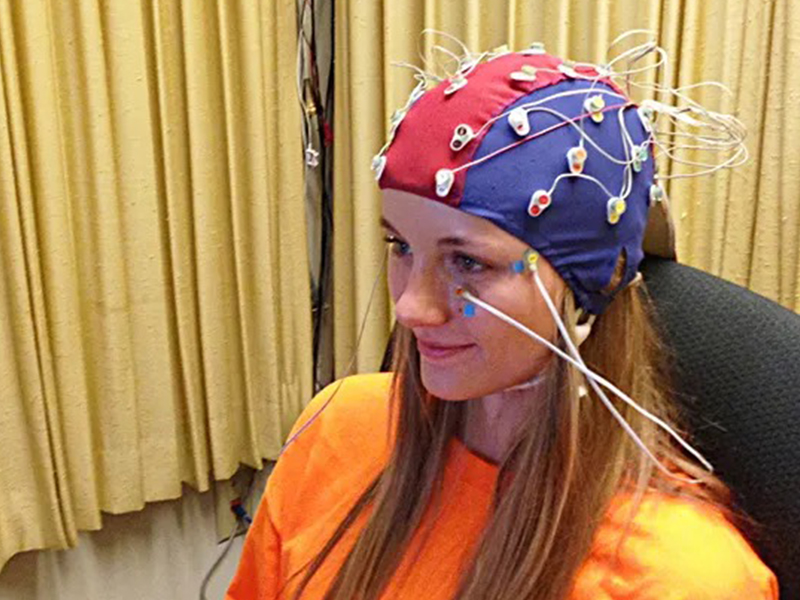Research
Performance and Exercise
 Current research is investigating the role of anxiety in performance and exercise
contexts. More specifically, this research seeks to examine the impact of situational
pressure and social anxiety on performance and error-monitoring. Additionally, research
is investigating the effects of aerobic exercise on state anxiety and measures of
psychophysiology. The goal of this research is to understand the ways in which anxiety
impairs attention and performance using event-related potentials. This research may
also provide support for the use of exercise to reduce symptoms of anxiety and related
disorders.
Current research is investigating the role of anxiety in performance and exercise
contexts. More specifically, this research seeks to examine the impact of situational
pressure and social anxiety on performance and error-monitoring. Additionally, research
is investigating the effects of aerobic exercise on state anxiety and measures of
psychophysiology. The goal of this research is to understand the ways in which anxiety
impairs attention and performance using event-related potentials. This research may
also provide support for the use of exercise to reduce symptoms of anxiety and related
disorders.
Social Anxiety
 This study investigates the role that specific elements of social contexts play in
maintaining interpersonal difficulties by using self-report, behavioral, and biological
perspectives. More specifically, this research examines cognitive and interpersonal
factors that may maintain functional impairments within those with social anxiety.
The goal of this research is to clarify cognitive biases in attention toward threat
and emotion processing within individuals who have social function impairments (e.g.,
those with social anxiety concerns, those who are sensitive to social rejection).
Additionally, this study may provide information in how interpersonal fears contribute
to performance monitoring and interoceptive awareness. This is especially important
given that such difficulties are widespread (i.e., generalize to a number of situations,
individuals, emotions) and impact both internalized experiences as well as overt behaviors.
This study investigates the role that specific elements of social contexts play in
maintaining interpersonal difficulties by using self-report, behavioral, and biological
perspectives. More specifically, this research examines cognitive and interpersonal
factors that may maintain functional impairments within those with social anxiety.
The goal of this research is to clarify cognitive biases in attention toward threat
and emotion processing within individuals who have social function impairments (e.g.,
those with social anxiety concerns, those who are sensitive to social rejection).
Additionally, this study may provide information in how interpersonal fears contribute
to performance monitoring and interoceptive awareness. This is especially important
given that such difficulties are widespread (i.e., generalize to a number of situations,
individuals, emotions) and impact both internalized experiences as well as overt behaviors.
Generalized Anxiety
 Generalized Anxiety Disorder (GAD) is characterized by excessive and uncontrollable
worry about a number of daily events. Individuals with chronic worry perceive uncertain
situations as more stressful and upsetting than non-anxious individuals, leading to
a number of avoidance strategies and attentional biases. Intolerance of uncertainty
is a key element of GAD; however, little research has examined cognitive biases and
task performance under conditions of uncertainty. This project aims to examine differences
in anticipatory processing and attention among individuals high and low in worry.
Generalized Anxiety Disorder (GAD) is characterized by excessive and uncontrollable
worry about a number of daily events. Individuals with chronic worry perceive uncertain
situations as more stressful and upsetting than non-anxious individuals, leading to
a number of avoidance strategies and attentional biases. Intolerance of uncertainty
is a key element of GAD; however, little research has examined cognitive biases and
task performance under conditions of uncertainty. This project aims to examine differences
in anticipatory processing and attention among individuals high and low in worry.
Participate in Research
The Brain and Anxiety
Who can Participate?
We are seeking out adults age 18 and older who have not suffered a traumatic brain injury (e.g., concussion).
What will you be asked to do?
 Our lab evaluates the consequences of anxiety. You will be asked a few questions over
the phone to schedule a participation time and get basic information to ensure the
study is right for you. When you attend your session you will complete questionnaires,
engage in computer based attention tasks while we record brain waves and other bio-signals
(for example: heart rate) using an electrode cap and other electrodes. Additionally,
we may collect a saliva sample to evaluate emotional markers and some individuals
may be asked to complete and interview.
Our lab evaluates the consequences of anxiety. You will be asked a few questions over
the phone to schedule a participation time and get basic information to ensure the
study is right for you. When you attend your session you will complete questionnaires,
engage in computer based attention tasks while we record brain waves and other bio-signals
(for example: heart rate) using an electrode cap and other electrodes. Additionally,
we may collect a saliva sample to evaluate emotional markers and some individuals
may be asked to complete and interview.
What do you get?
For your participation you will receive $20 per session you attend. Each session should last approximately 2 hours.
What is the goal of the project?
Our goal is to examine the relationship between certain patterns of thoughts and emotions with attention, and physiological functions like heart rate and brain activity. This information will help us to understand how we as human beings process information and how this relates to specific emotions and thought styles.
Contact us:
Support
Support for our project are provided by the Oklahoma Center for the Advancement of Science and Technology and the Oklahoma State University's President's Fellow.
